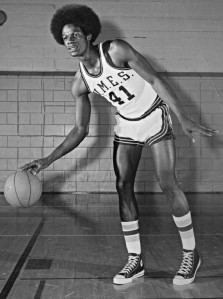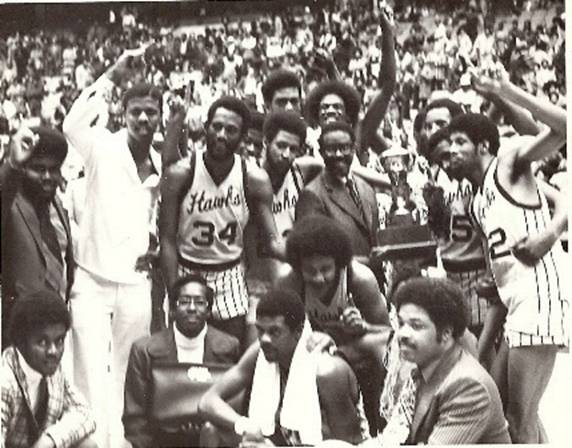Modern-day men’s basketball teams at the University of Maryland Eastern Shore measure themselves against a trailblazing standard set during an extraordinary – and controversial – 1973-74 season.
The Fighting Hawks were nationally ranked that year and became the first historically black college to be invited to play in the venerable National Invitation Tournament. A charter member of the fledgling Mid-Eastern Athletic Conference, which formed in 1969, UMES held dual memberships in the National Association of Interscholastic Athletics and the NCAA Division II ranks.

The John Bates-coached team spurned the NAIA Tournament — the standard forum at the time for small colleges and universities – to compete for what was a gaudier title at the time. The Hawks, who compiled a near-perfect 26-1 regular-season record, set out to prove they could play with anyone in the country.
After losing the 1973 NAIA Championship game to Guilford College on a last-second Hail Mary play by a squad featuring future pros Lloyd “World B.” Free and M.L. Carr, the Hawks returned a veteran team the next season anchored by seven seniors.
Led by Talvin Skinner, who played two years professionally in Seattle, the Hawks authored a magical season. The squad averaged 97.6 points per game 13 years before the college game adopted the three-point shot.
The team’s lone regular-season loss was by two points to Morgan State, which featured 7-footer Marvin “The Human Eraser” Webster, who played professionally for the New York Knicks. The setback came in a game that was the team’s fourth in four days. It won at North Carolina Central on a Friday, topped North Carolina A&T the next day and followed that with win a road victory over Howard on Sunday.
Monday morning, the team awoke to news it was ranked No. 20 in the Associated Press weekly poll. The loss to Morgan came that night.
That lone blemish on the record was enough to deny the team a bid to the NCAA Tournament, which that year invited only 25 teams.
The chance to play in the NIT came, however, and the team accepted the invitation despite a commitment to play in the NAIA playoffs. The repercussions for UMES: the NAIA imposed financial and probationary penalties.
Nevertheless, the Hawks beat Manhattan College in their first-round NIT game at New York’s Madison Square Garden. In round two, however, they fell to Jacksonville University.
Skinner was a third-round National Basketball Association draft pick of the Supersonics and a fourth-round pick of the old New York Nets of the now-defunct American Basketball Association. The Portland Trailblazers drafted Rubin Collins in the second round and William Gordon was picked in the fourth round by Seattle. Teammate Joe Pace, who transferred to Coppin State the following year, was drafted in 1975 by the Washington Bullets and won a title with them in 1978.
The entire 12-man roster from 1973-74 was inducted into the UMES Athletics Hall of Fame in 2004.

Making their own Mark
UMES did not field a women’s basketball team until 1973-74, but the program has been steadily building some history of its own.
The Lady Hawks got their first taste of success with a (Maryland) Association of Intercollegiate Athletics for Women (Division II) title in 1977-78.
During the program’s first 35 years, nine Lady Hawks shot their way into the 1,000-point club, the most recent being Casey Morton of nearby Mardela Springs, who ended her career in 2011 with 1,230 career points.
Monica Felder, a member of the UMES Athletics Hall of Fame (1999), finished her career as the all-time UMES leading scorer with 2,008 career points. April McBride accomplished the 1,000-point milestone during the 2008-09 season as a junior, and tallied 1,698 points.
Sondra Cockfield, a 2010 inductee in to the UMES Athletics Hall of Fame and 1992 MEAC Player of the Year, is another 1,000-point club member. Cockfield also finished her career with 282 assists, including a school record for one season (1990-91) with 160.
The other Lady Hawks who scored at least 1,000 points in their career are: Phyllis Hendricks (84-87), Peggy Edwards (90-93), Kriste Sheldon (96-99) and Nicole Council (97-00).

